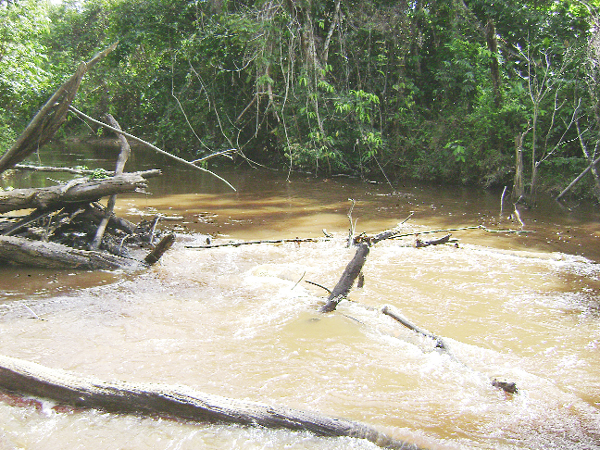-residents pleading for relief
Environmentally unsound mining practices continue at Arau despite many complaints to several government agencies and residents of the remote indigenous community are again pleading for proper regulation of such activities.
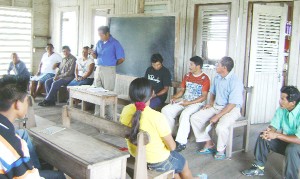
Eight months after Stabroek News reported exclusively on the plight of the Region Seven (Cuyuni/Mazuruni) community and following public statements by Acting Commissioner of the Geology and Mines Commission (GGMC), William Woolford and Minister of Amerindian Affairs, Pauline Sukhai, that action was taken, a visit by journalists to the community last week found the situation basically unchanged from eight months ago and villagers say, even longer.
Following what it said was years of pleas, the Arau village council last week, again appealed to the government and state regulatory bodies for mining and the environment, to immediately take steps to prevent further destruction of their traditional lands and the environment surrounding the village.
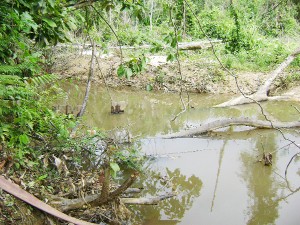
“The people of Arau village recognize that mining is an important form of economic activity and we have engaged in some mining of our own but what we urgently request is the proper regulation of mining to prevent further damage to the environment and to the lives of our people”, said Devroy Thomas, the chief of the village, located close to the border with Venezuela.
His words were underscored by several villagers, who detailed the effects suffered as a result of the mining activities and made impassioned pleas for action to be taken. The villagers raised issues of pollution of the Arau River, damage to the land and forest, destruction of the habitat of fish, stagnant water in open pits, possible contamination due to the use of mercury, health and social issues, among others. These were the same issues previously raised when Stabroek News last visited.
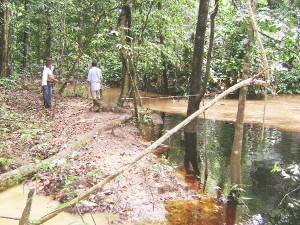
After this newspaper’s report was published in July last year, Woolford had said that the complaints by the Arau residents had been investigated and declared that there are no mining properties within the boundaries of the titled area of Arau. “GGMC has stopped holders of mining properties which are outside of the titled area from conducting any operation that would affect the farms or the community or pollute the waters”, he wrote in a letter to Stabroek News. Sukhai, in an interview at the time, told this newspaper that one miner whose operation was near to the buffer zone surrounding the village, was relocated while “mining has been stopped in Arau Top”. She had further asserted that actions were taken “to the satisfaction of the village council” and had said that she was informed of the developments by the GGMC.
However, this newspaper’s visit last week found that little had changed and villagers frustrated that their cries seem not to have been heard. A visit to Arau Top revealed that the number of miners upriver had decreased reportedly as a result of problems with the concession holders. But the river is still filled with sediments and muddy and mining is taking place on the river bed with the waterway diverted as a result. A large portion of the Arau River has now been diverted into another creek. Tailings are discharged in a haphazard manner. Toxic mercury –used in gold processing – remains a concern to the villagers and the river water remains unusable. Residents had previously told this newspaper that the colour of the water had begun to change some years earlier since mining began up the river and it had worsened since 2006 with no changes since. When this newspaper had last visited the area, the colour of the water was yellowish and this still obtained though further down it was diluted somewhat but still filled with sediment. The difference in relation to other creeks, with clear, black coffee-coloured water is obvious.
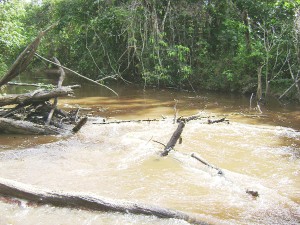
Thomas said that following the publishing of the report in this newspaper last year, the miners had moved inland but then moved back to the waterway. Villagers noted that GGMC Mines Officers have periodically visited the area but this seems to have had little effect and they are not satisfied and frustrated at the slow process. “They don’t seem to be doing nothing”, the Chief said. A GGMC source told this newspaper that reports about the situation on the ground are sent to the regulatory agency but there is little follow-up action. According to the source, a local mines ranger in the area issues warnings to the miners when they are in breach of the regulations but villagers said that the local ranger has limited power and this hampers his work.
Microcosm
When this newspaper was in the area, an operation at Arau Top was issued with a cease-work order by the local mines ranger because the mine was operating in the Arau River, blocking it in breach of the mining regulations. The following day, reports say, the concession owner came and reportedly told the Ranger that a named senior GGMC official had given him permission to resume operations and had reportedly assured him that he was not breaking any mining laws. This, the residents said, is a microcosm of the problem faced by them, where reports from the ground are not heeded by those at the GGMC headquarters. The area where the breach took place was visited by this newspaper last year where at the time a portion of the river had already been diverted. On that last visit this reporter took photos of that area including the blocked portion of the river and the new path of the river. Photos were also taken of the same area during last week’s trip but it now bears no resemblance to the image taken last year. The Arau River does not flow where it once used to.
Thomas said that with this, there are new fears. He related that when the miners moved back to the river, the portion mentioned was further diverted and the miner began operations on the eastern side of the original channel claiming that the waterway was further away and he was in his own concession. He said that some others attempted to get permission to mine on the eastern side of the river but this was denied.
The Chief related to this newspaper that recently too, some men with metal detectors were found on the village titled lands without permission from the village council. He said that the persons ignored village councillors when they were spoken to and continued to work but when he intervened they left but it is suspected that they are still around. He said that in the past several weeks seven persons with metal detectors were found in the titled area.
Sickness
But it is not only the environment which is a source of concern. “We are experiencing a lot of sickness”, Community Health Worker, Mildred Sammy said. The woman stated that that she has never seen many cases of illnesses among the villagers before but this is now occurring. She said that she was worried about what would happen when larger numbers of residents contract illnesses. Sammy disclosed that malaria is becoming more prevalent and she says that this is because stagnant water in abandoned mining pits provides breeding places for the mosquitoes. She said that there have been suspected cases of typhoid but she is unable to confirm this with tests though the affected persons show all the symptoms and they have tested negatively for other diseases. One man was sent to the city for tests for that illness last week. The health worker also raised the issue of sexually transmitted diseases, which she said have been detected in the community recently.
Meantime, in their statement, the Arau Village Council pointed out that they had pleaded with the relevant authorities for proper regulation even before 2001 when they took legal action against a miner who had been granted a mining concession over a major portion of what they consider their traditional land. In that case, the court granted an injunction against the miner. The statement said that a few years later it appeared that new concessions were granted as many miners began to return to the area. The village council said that because of the severe damage to the environment, especially in the areas used for hunting and farming, and the damage to the river, which they depended on for household use, legal action in the form of a constitutional motion, was again filed and is still to be concluded.
“Most of the mining takes place on lands that are our traditional untitled lands and which we depend on for our survival. In order to have these areas titled, we applied for an extension of title in October 2008 under section 59 of the Amerindian Act 2006. We are still awaiting the response of the Minister required under the law acknowledging receipt of the application”, the village council’s statement asserted. The residents urged the government to act quickly to assist them.

